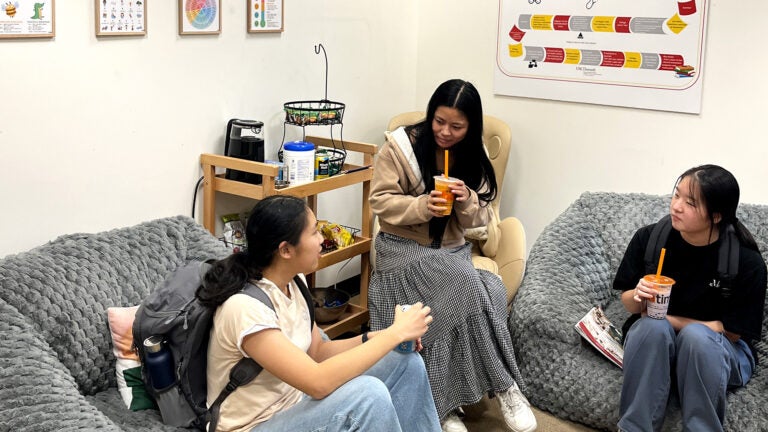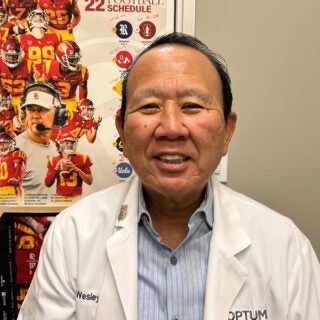
Alumnus’ philanthropy gives pre-health students a place to recharge
Students who dream of becoming doctors, dentists or other health care professionals face unique challenges as they navigate academic requirements, clinical experiences and professional school applications. At the USC Dornsife College of Letters, Arts and Sciences, the Pre-Health Advisement Office has for decades offered these students critical support — and now it has a new resource to extend this help even further, fostering connection, wellness and success.

The Pre-Health Scholars Den is the first initiative to come from the Wesley Tyra Mizutani Endowed Fund, established by USC Dornsife alumnus Wesley Mizutani to provide permanent support for wellness and mental health initiatives at the Pre-Health Advisement Office.
“We’ve always wanted to create a student-centered space where they can find both support and connection, and I believe we’ve achieved that,” says Molly Lancaster, executive director of the Office of Pre-Health Advisement. The den is open daily for peer advising and drop-in wellness programs, offering a welcoming environment where students can study, share experiences and find encouragement from their peers.
The space has already hosted a spring welcome-back gathering and wellness initiatives, with more activities planned throughout the semester.
Comprehensive advising for pre-health students
“In our office, pre-health is an umbrella term that encompasses several professions, including medicine, pharmacy, dentistry, physicians assistants, nursing, optometry, physical therapy, occupational therapy and veterinary medicine,” says Ailene Huang, a pre-health staff advisor. “We really want to encourage students to explore and lean into their curiosities about what type of work feels fulfilling.”
USC Dornsife’s pre-health advising program takes a holistic approach to preparing students for health care careers. From the moment students declare an interest in pre-health, dedicated advisors help them chart their academic and extracurricular paths.
“We’re here not only to support students and provide the resources they need for their health professional paths, but also to help them cultivate skills that will help them grow as people, as students and as overall professionals,” says Rebeca Diaz, a pre-health staff advisor.
The office provides one-on-one advising, workshops on topics such as preparation for the Medical College Admission Test, medical school applications, and connections to research and clinical experiences. Advisors work closely with students to ensure they not only meet academic requirements but also build meaningful relationships and leadership skills essential for a career in health care.
“Sometimes you have questions that don’t need an entire 30-minute meeting, so it’s really helpful to be able to walk in and get that question answered right away,” says senior Brandon Do, a student worker in the pre-health advising office.
The program also encourages students to gain hands-on experience through research, shadowing working professionals, and service-learning opportunities.
“Shadowing at Johns Hopkins Hospital has been an influential and eye-opening experience,” says junior Ethan Fayne, a pre-health peer advisor majoring in biochemistry. “I saw a lot of departments there and got a better sense of the niches of medicine I’m interested in.”
Fayne says he has also been able to find mentorship through shadowing. “It’s been so helpful hearing from an acting physician about their process and their advice for not getting burnt out.”
A prescription for student wellness
The medical field can be a breeding ground for mental health issues for professionals and students alike. The pandemic brought about struggles for both Mizutani, a rheumatologist with Optum, and his daughter, then in her first year of medical school.
The experience inspired Mizutani, who earned a bachelor’s degree at USC Dornsife in 1977, to make a planned endowment gift of $100,000 to the USC Dornsife Pre-Health Advisement Office to help pre-health students navigate the demanding educational path toward high-pressure careers. He hopes that wellness programming will destigmatize the need for mental health.
“Struggling with mental health is seen as a big taboo because we think that we’re not supposed to have that kind of weakness,” he says. “I wanted to support programs that make mental health care more accessible for students.”
Mizutani says the interdisciplinary opportunities he received as a USC Dornsife undergraduate were instrumental in launching his career. “All the help I’ve been able to provide to people through my profession would have never been possible without the foundation that was built for me through my experiences at USC,” he says.
Now, as a professional mentor for pre-health students at USC Dornsife, Mizutani is paying it forward by guiding the next generation of physicians through challenges such as understanding the business of medicine, changing directions while on the pre-health path and working in the growing field of managed care.
Training well-rounded physicians for better patient care
At the heart of the pre-health advising program is the belief that strong health care professionals are not only academically prepared but also deeply compassionate and service-oriented. Advisors emphasize that developing empathy and a sense of community are just as crucial as excelling in coursework.
“Of course, we want strong academics, but we also want health professionals to be caring, compassionate and inquisitive,” says Huang. “We want practitioners who are interested in learning about the histories and complexities of various populations and how best to serve them.”
Students are encouraged to embrace this mindset early by engaging in volunteer work and developing a strong sense of community.
For students like Fayne, finding a supportive peer network has been invaluable. “I have a group of pre-health friends who all study together and work on applications together,” he says. “It’s very uplifting to have that environment.”
“Being in a health care profession, you’re always helping people who are at a very crucial juncture in their life,” Huang adds. “That service orientation is something we want to encourage students to start right now, not 10–15 years down the road. It’s something they’re doing now at USC with their peers.”